#Success Networking
Explore tagged Tumblr posts
Text
Temecula Valley Business Network – Connecting Success, Building Community

In the heart of Southern California’s wine country, the Temecula Valley Business Network stands as a thriving hub for local professionals, entrepreneurs, and service providers. More than just a networking group, it is a powerful community built on relationships, collaboration, and shared growth. With a simple but impactful mission—"Helping People Grow Better Together"—the network brings people and businesses together to create long-term success in both personal and professional life.
If you're looking for a supportive, energetic, and inclusive group where success is celebrated and community matters, the Temecula Valley Business Network might just be the best move for your business.
How It Works
Unlike traditional networking groups that follow strict rules or quotas, the Temecula Valley Business Network focuses on people, not procedures. It’s designed to be accessible, affordable, and authentic—ensuring that every member gets real value from their participation.
Here’s how it stands out:
We Focus on You, Not the Rules No pressure, no politics—just honest connections and shared goals.
Trust & Relationship Building We build strong, trustworthy partnerships through ongoing support and interaction.
Affordable & Accessible Membership is budget-friendly, making it easy for small business owners and solo entrepreneurs to join.
Member Presentations Each member has the opportunity to share their story, services, and expertise with the group—turning meetings into platforms for personal branding and professional growth.
Increase Your Reviews One of the key benefits? Your fellow members can leave reviews, recommend your business, and help you build credibility in the community.
Learn more about how it works and why so many business owners are choosing to grow with us.
Our Mission: Growth Through Connection
The mission of the Temecula Valley Business Network is clear:
"To create a collaborative environment where businesses and individuals can connect, learn, and grow through regular meetings, educational workshops, and community outreach."
This mission is more than words—it’s a driving force behind every meeting, event, and collaboration. Whether you're attending a weekly networking event, participating in a workshop, or just grabbing coffee with a fellow member, the focus remains the same: growth through connection.
Our Vision: A Reliable Referral Network
In today’s competitive market, trusted referrals are everything. The vision of the Temecula Valley Business Network is to:
"Establish a reliable network of businesses and service providers that members can confidently recommend within the community."
We’re building more than contacts—we’re building confidence. Members actively refer each other to clients, friends, and family because trust is built over time through consistent engagement and proven results.
Our Core Values
Every organization is defined by its values. At the Temecula Valley Business Network, our values are what bind us together and guide our growth.
Relationships We believe in nurturing genuine, lasting relationships that go beyond transactions.
Growth We exist to help you grow—not only your business but your mindset, skills, and impact.
Collaboration Working together is our strength. We share leads, ideas, and opportunities freely.
Fun Growth doesn’t have to be boring. We keep things light-hearted and enjoyable, making our events something members look forward to.
Explore more about our core values and how they shape our community.
Why Join the Temecula Valley Business Network?
Whether you're a startup owner, established professional, freelancer, or service provider, the Temecula Valley Business Network offers an open door to opportunity.
Here’s what you gain when you join:
Real Connections – Meet people who genuinely want to help you succeed.
Learning & Development – Attend workshops and presentations that expand your knowledge and skills.
Brand Visibility – Get your business in front of the right people through member shout-outs, reviews, and features.
Shared Wisdom – Learn from others’ experiences, challenges, and success stories.
Community Presence – Be part of a trusted referral network embedded in Temecula Valley’s thriving business landscape.
Browse testimonials, photo galleries, and upcoming events on the official website to see the community in action.
Ready to Connect?
The Temecula Valley Business Network is more than a group—it’s a movement toward meaningful growth. If you're looking for a space where business and community grow together, this is your place.
Visit temeculabusinessnetwork.com today to learn more, view upcoming meetings, or apply to join. Let’s grow—better, stronger, together.
#Temecula Business Network#Business Networking#Temecula Valley Professionals#Community Building#Local Business Growth#Business Connections#Temecula Entrepreneurs#Networking Events#Business Development#Professional Relationships#Temecula Chamber#Success Networking#Business Collaboration#Temecula Valley Community
0 notes
Text
Truly one of best parts of Artificial Condition is that ART embraces its new designation and introduces itself as Art to Tapan and the rest of the clients at the end of the book. There is no actual record of its official name in this book. To Murderbot it is only ART, the Asshole Research Transport. Perihelion who? No idea. Not important.
#that is best friendship right there#it doesn’t know nor care about arts government name its going to call it by its nickname until they both die#art meanwhile is like this is my weird construct I love it it thinks I’m an asshole and gave me a nickname and I’m gonna use it forever#murderbot#the murderbot diaries#artificial condition reread#talking into the void#no wonder art has to go find it in network effect#ain’t no way mb is gonna be successful googling asshole research transit and getting correct info#art (asshole research transport)
196 notes
·
View notes
Text

This point has been made like 38850 times but LISTEN they we're at Harvard at the same time
1K notes
·
View notes
Text
I was your only friend. You had one friend /// There’s a friend card here if you want to play it. You know that, right?
this edit on tiktok
#i love the parallels#need to know what ben affleck thinks about tsn#i hope tsn exists in succession universe#markwardo#kenstewy#kendall roy#stewy hosseini#succession#the social network#tsn
323 notes
·
View notes
Note
What’s the architecture/layout of old Bur, how do modern people perceive the ruins?
The city in its peak was very large and spread over both shoreline and a network of small islands. These islands comprised a waterfront district connected by a network of bridges and canals, where a large portion of its non-agricultural lower class lived.
It had a fairly well organized and efficient freshwater+sanitation system across most of its span (the canal district had less effective plumbing largely due to logistical difficulties, most of its wastewater was instead flushed by rain powered cisterns). The water system was powered by the Hsuke river and made fresh water readily accessible throughout the majority of the city (though few homes had direct freshwater plumbing). It had several major public baths, and the homes of the wealthiest members of society had their own private bathing pools.
In this part of the world, it is broadly regarded as once being one of the most beautiful cities to have ever existed. It was particularly noted for its water gardens (still a fixture of present day Burri culture) which were absolute marvels of engineering for that period, with the majority of these being entirely artificial and supported by its network of aqueducts. These hosted thousands of ornamental plants, fish, and fowl, as well as fruiting trees and shrubs. They were treated as a public work meant to benefit all citizens, and existed throughout the city.
The palace in particular was noted as impressive, in part for its architecture but mainly for its gardens. These hosted 'exotic' plants and a menagerie of animals from across the empire's territory, and existed in part as a symbol of the state's power and reach. It was a trend for emperors to bring in the fiercest animal from each conquered province to the grounds, with the an-nechoi being the beast of choice from the lands across the sea to the east, with one (Probably erroneously) cited as killing thirty servants in the process of moving it into the gardens.
The palace was located within the temple district. This district housed over a hundred shrines to the various lesser deities of the pantheon, and temple complexes to the seven chief deities (the firstborn gods who created the world, all other gods were later descendants). Old Burri temples were Kinda similar in shape to a ziggurat, though had an accessible interior space and a central tower which housed the shrine. At this time, the chief gods were believed to physically inhabit their temples. Each god had its own high priest permitted to attend to their shrine, with the emperor being the high priest to Inanariya (king of the gods) and the only person permitted to directly commune with this deity. The foundations to these temples are relatively intact in the present day, though none of the towers remain (collapsed in earthquakes with no one to rebuild them).
The city was heavily fortified, having one external wall surrounding most of its length, and an internal wall surrounding the palace/temple district (which doubled as a fortress).
---
The period of sea level rise began with a 500ish year period of mostly gradual increase, which occurred slowly enough that most infrastructure could adapt very easily and the problem went unnoticed by most (the city of Bur experienced most of its Growth during this time). It then culminated with about a century of (relatively) rapid rise, which is the direct cause of the city's abandonment.
The canals flooding had always been a problem during storms, but this began to occur with notable frequency, alongside the water level as a whole rising quickly enough to be noticed on an immediate human timespan. The canal district was maintained for a while by rerouting some of its waterways and building up barriers, but it was the first part of the city to be abandoned. Things got more serious when the mainland parts of the city grew increasingly impacted by storm surges that never seemed to fully retract, and major parts of its surrounding farmland were hit by surges and tidal waves, and rendered too saline to remain arable.
The actual single biggest cataclysm was the collapse of the city's mainland sewage system. It was built with flood canals as a failsafe, but these were built to withstand heavy rain rather than an encroaching ocean. Storm surges would cause large segments of the city to be flooded with sewage (including some of the freshwater plumbing), and serious disease outbreaks would follow.
These issues were enabled/exacerbated by earthquakes (the region is geologically active and this isn't unusual) that further damaged and mingled the sewage and freshwater systems. One earthquake and its subsequent tidal wave was a turning point, and the resulting breakdown of (already strained) infrastructure rendered a large swath of the city uninhabitable in the space of about a week. This also just caused immediate damage to much of the city's architecture/walls, and collapsed the tower of the temple to Inanariya (never a good sign). This is when the full exodus began, first with people flocking to un-flooded parts of its city and farmlands, and those who could afford it fully relocating to other cities/towns.
All of this issues were compounded by the 1st Burri Empire already being in a period of collapse at this time. This was largely a matter of simple overextension. Its borders were constantly under attack by rival states/its victims, sometimes with great success. Bur's own population had burgeoned well past what the imperial core land could sustain, and its cities relied predominantly on extraction of foreign grain/goods to feed their people. It lost most of its eastern land holdings in a fairly rapid timespan (overextended with wars at multiple fronts), which caused frequent famines in its core.
This put pressure on its final emperors to invest in increasingly desperate expansionist projects, while attempting to keep up public morale with lavish public works and objectively stupid vanity projects. The attempt to excavate a canal at the Viper seaway's 'tail' (one of the few eastern regions it retained secure control of at that point) was in part a desperate act to revive its economy by opening up/monopolizing a new trade system. The amount of money and manpower sunk into this ultimately doomed project was followed by Bur being fully ousted from its eastern holdings, and was one of the final straws in its collapse.
People in the city of Bur proper were dealing with the double front of starvation and their homes + streets + immediate water supply being flooded with seawater and literal human feces. These issues impacted the lower classes first and most severely, but ultimately transcended class boundaries. Famine grew more and more rampant, not only with the loss of the colonial holdings that supported the population but of farmland in the imperial core- much of the city of Bur's immediate farmlands were unproductive due to repeat inundation with saltwater during surges, and the farmland along the Yamage river to the north was rapidly being captured and pillaged by the Hsem (historical enemies, a nomadic group with a khait warrior culture from further west).
All this was fucking unlivable in of itself, but also had very obvious implications in the context of Burri emperors also being high priests and the chief intermediary between the gods and the people. Not only was the government failing to sustain its citizens to begin with, but signs of divine disapproval were deeply apparent.
So the last days of the 1st Burri empire were a chaotic period of civil unrest, most acute in and around city of Bur proper. This involved near-constant peasant revolts and several attempted coups. The last Burri emperor (of the First empire) ultimately fled the capital of Bur and reestablished in Titenegal, declaring it the new capital. This was then sacked by the Hsem within a year and after that it was fucking Joever.
The city of Bur was functionally abandoned by this point. People still Lived There and there were several attempts to set up a new government, all of which failed in the short term. After the collapse was complete, its inhabitants were mostly just peasants who built up new homes further inland and sustained themselves on the remaining farmland. Few people lived permanently in the city proper due to all of its intact infrastructure being effectively non-functional without the governmental bodies/human labor to sustain it.
---
It should also be noted that it was Extremely not just Bur that was flooded, the sea level rise was worldwide (resulting from a collapsing ice sheet) and almost Every coastal city during this period experienced the same issue. Bur's demise was just notably dramatic in that it was once the most heavily populated human city that has Ever Existed, and directly correlated with the fall of the empire it hosted.
The flooding was fairly gradual, but it's been 7 centuries since the first Burri empire's collapse and the fall of its capital city, and many contemporary records were lost to the immediate chaos and to the large span of time since. Cultural memory tends to reframe the flood VERY rapid on a human scale, many of the stories describe the city being swallowed in a single wave as an act of divine punishment (the popular notion at the time that the last emperors deeply displeased and shamed the gods has stuck into the narrative, often exaggerated into stories of them being horrifically debauched blasphemers guilty of the worst disgraces imaginable). Even more conservative accounts tend to imagine the totality of the destruction taking place over the span of about a year (merging the memories of the immediate earthquake devastation with more gradual elements of its slow flooding). People widely believe that most of its residents drowned in the city's cataclysmic demise, and that the ruins are now Extremely haunted.
The state of the flooding is not 'completely under the sea' and you can still walk/wade through most of the inland ruins (the canal district is effectively submerged, with most structures that Would be above the water level having collapsed against the strain). As such, some people Do Live Here. These people are mostly smugglers and pirates using the ruins as a hideout, and/or opportunistic hunters and fishermen who won't let ghosts stop them. Entering the city ruins is currently forbidden (largely Because of the criminal nature of basically every motive to go here (even hunting, which is considered poaching)), but enforcement of this rule/active patrols to prevent entry are inconsistent.
The majority of Old Bur's inhabitants are animals. The un-flooded parts of the city and its gardens are now a host to a thriving community of native plants and animals (and a few descendants of escaped non-native zoo animals/ornamental plants that adapted well to the conditions).
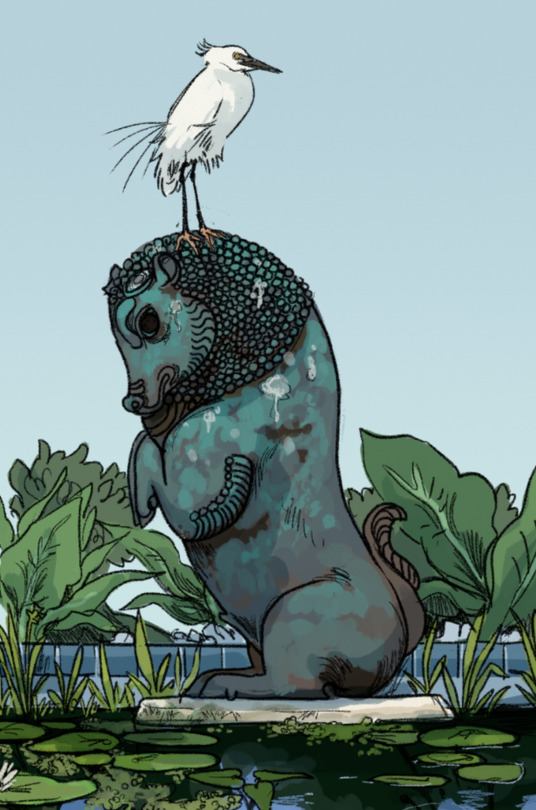
The egret shown here is a foreign species originally brought as an ornamental bird. In the centuries since its first import, it has become widespread and occurs on both sides of the Mouth seaway. It can hunt in both freshwater and saline environments, and a very large population lives permanently in the ruins of Old Bur.
Its common name is the ghost egret. Contemporary Burri folklore holds that the ghost egrets of Old Bur are literal ghosts, carrying the souls of those who died in the cataclysmic floods.
#[[JUST REALIZED you didn't even fucking. ask about the timeline of the flooding I just kinda went for it]]#[[its relevant to its contemporary state I guess????]]]#Added the photo without linking to the original post becasue it is WILDLY outdated.#Among other things I cited the population of the original city of Bur at 'over a million people'. Which is contextually ridiculous#Also (because this probably gets confusing) everything here describes the first of two empires out of Bur which was by far#the larger one. The second had a similar pattern in its downfall (overextension - famines at home - war and revolts at multiple fronts)#but was significantly less dramatic and had a much cleaner rebound (it ended in a successful coup that the contemporary#Burri Republic directly descends from)#I used to describe 3 Burri empires which. I don't know why I did that because the 1st of the three was an ANCIENT land empire#stemming from further west where contemporary Bur was its easternmost extent of Conquered lands. This collapsed like ~1500+#years before present and has no directly obvious impact on modern conditions whatsoever (it DID have major impacts#though: it's what first brought khait to this region and some of its ancient roads are still used in the largest continuous land#trade network in the northern hemisphere)
104 notes
·
View notes
Text
i love the trope of the two guys who have a deep friendship with heavy homosexual undertones and then one of them betrays the other and they have a very emotional breakup scene



260 notes
·
View notes
Text
the thing that’s wild to me is that we can’t even be like “oh it went down hill, it used to be good several seasons ago” like no…it used to be good LAST EPISODE. it used to be good during beenado…and then it got bad..then good again..then GREAT..then exorbitantly bad..then good..then confusingly bad.. the lack of consistency is crazy… what point am i trying to make here? idk but it almost would be easier if there was a very clear cut off point and it just routinely exponentially got bad from there bc then I could have seen this coming
#tv: 911#911 negativity#except kinda not bc tbh I still like this show ?? like? it is still good..it’s network tv procedural good which is a diff kind of good from#like. succession but still. i like it it’s my little show#🌙
42 notes
·
View notes
Text
bitches be like "i can win chopped" then go on and cook a risotto 💀
283 notes
·
View notes
Text
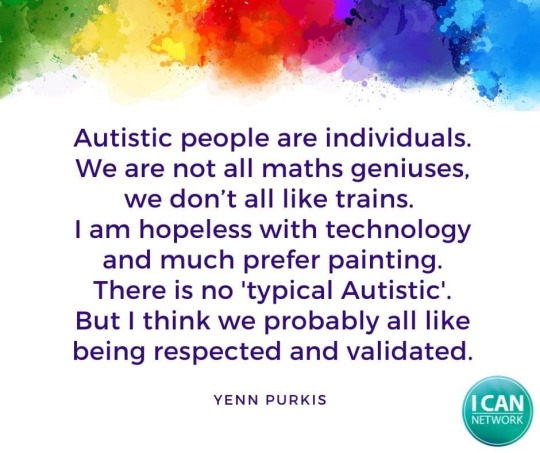
Very well said. ♥️
I CAN Network Ltd
#autism#actually autistic#honestly I wish I was a math genius#I would be more successful imo#feel free to share/reblog#I can network Ltd (Facebook)
471 notes
·
View notes
Text
Just had an interaction with a guy at a film networking event that I absolutely NEED to tell y’all about…
Him: oh yeah it’s that movie Glen Powell’s in
Me: gosh, what ISN’T Glen Powell in right now
Him: me.
Me:
Him:
77 notes
·
View notes
Text
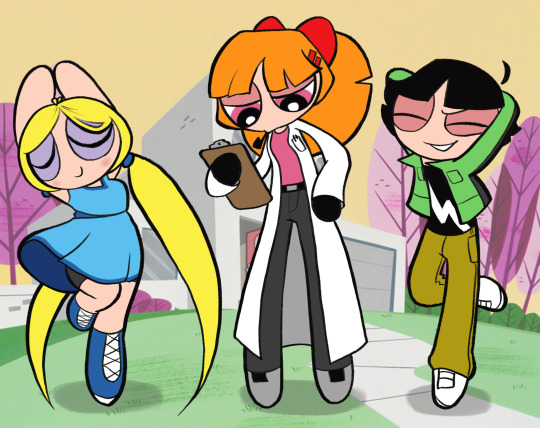
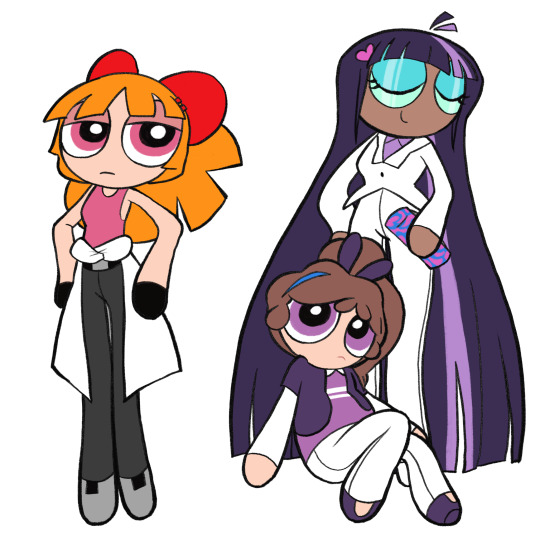
weow
#powerpuff girls#ppg#cartoon network#ppg fanart#idk what else to tag this#powerpuff girls is the first thing i ever remember drawing digitally#i’d just sit down and watch speedpaints constantly and i wanted to make them myself#anyway i’ve been going back and forth on posting this bc they’re not the most original designs ever but Shrug#full disclosure i didn’t watch the Bliss episode and have zero interest in ever doing so#i just wanted to portray her as The Grown Up and i thought her being like a successful business woman would be funny#i originally intended for the others to be adults but after i was finished they strike me as a little younger still#so in my head they’re like 17 maybe#bliss is also based off a redesign i made when that episode first came out#bliss is also based off a redesign i made of her when that episode first came out#i considered using her original appearance but i literally refuse to work with her weird ass bangs
139 notes
·
View notes
Text
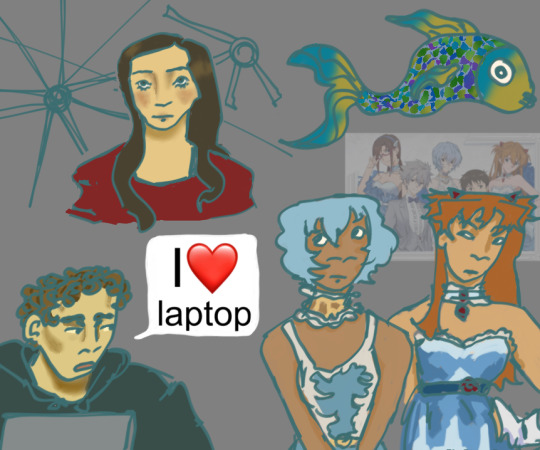

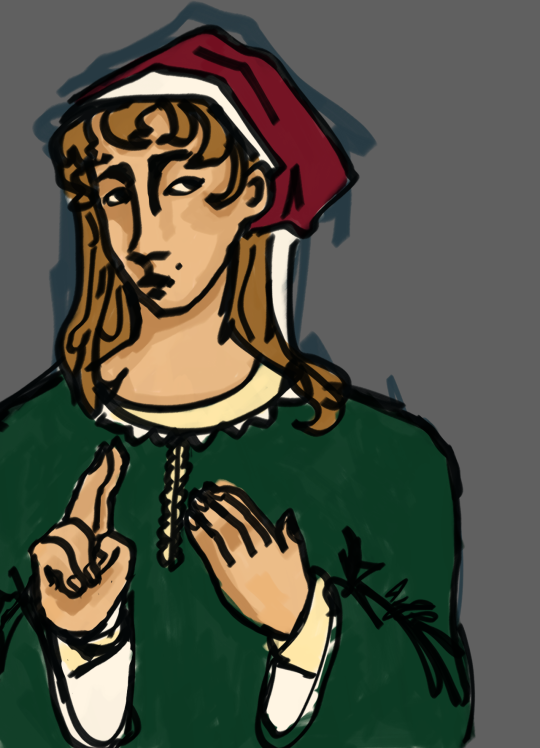


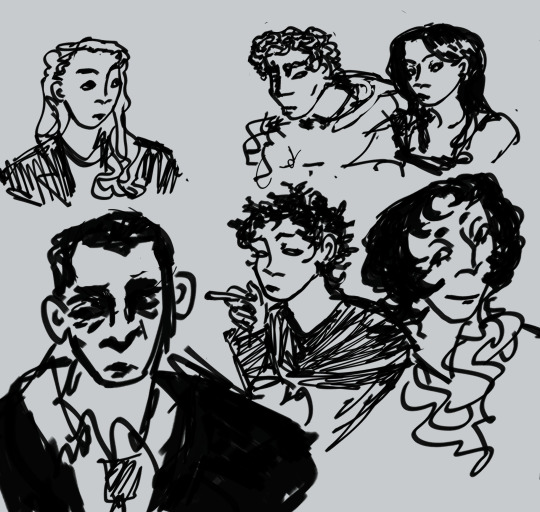
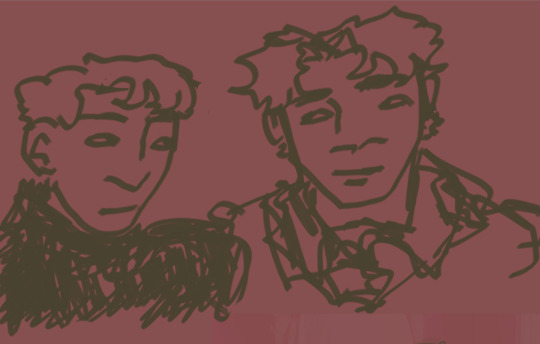
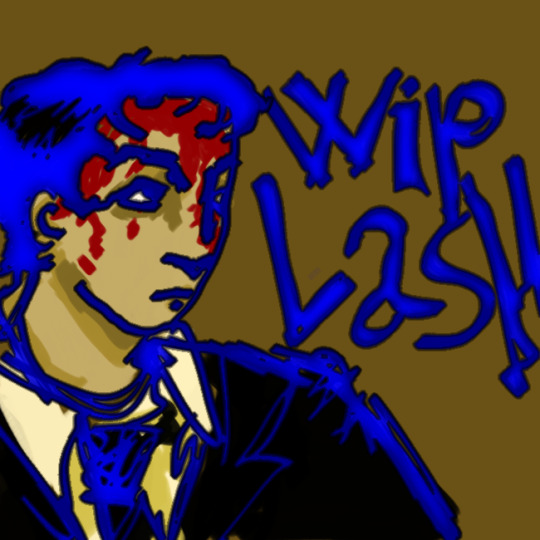


Bunch of mediocre sketches and wips I won't finish
#Me whenever I have a corner I don't wanna fill RANDOM FUCKING PNG!!!!!#tsn#succession#fight club#dfk#das fliegende klassenzimmer#my art#art#saw#jerma985#jerma#the passenger#shiv roy#kill bill#Whiplash#oc art#vampire#amanda young#saw art#kendall roy#evangelion#neon genesis evangelion#the social network#rei ayamani#asuka langley#nge fanart#Rozi art
90 notes
·
View notes
Quote
In his book, Networking is a Contact Sport, Joe Sweeney advises that when you attend networking events, act as if it is your party and you are the host or hostess. By doing this, you will help others be at ease and demonstrate a heart of service and generosity.
Susan C. Young, The Art of Action: 8 Ways to Initiate & Activate Forward Momentum for Positive Impact
#quotes#Susan C. Young#The Art of Action: 8 Ways to Initiate & Activate Forward Momentum for Positive Impact#thepersonalwords#literature#life quotes#prose#lit#spilled ink#communication-skills#customer-service-quotes#motivational-speaker-susan-young#networking#positive-first-impression-quotes#quotes-by-susan-c-young#relationship-quotes#selling-success#service-beyond-self#susanspeaks-com
21 notes
·
View notes
Note
Hey, I love your account!❤️ I started my journey of being the highest version of myself. I wanted to ask some tips on how to be more intelligent and do you have some suggestions on podcasts, people you can follow that active on politics/history? English isn’t my native language.
Thanks! ❤️
Hi love! Thank you so much <333 I can't think of any specific podcasts/blogs at the moment, but sharing some other advice below. Bisous xx
Here are some of my tips:
Read books, articles, blogs, studies, and journals from credible & fact-checked sources
Watch & listen to evidence-based documentaries and podcasts
Take expert-backed courses and classes (from universities, industry leaders/certified organizations)
Attend forums/lectures from industry leaders museums, libraries, etc. (Virtually or in-person)
Talk to people in different fields and from different walks of life
Travel (globally, domestically, or locally), explore museums, parks, and stores in your area
Ask for feedback on your creative or skill-based projects and work; or insights from trusted people in your life on different situations in your life, from your past, or their greatest life lessons
Remain curious and diligent regarding your pursuit of knowledge. Live as a lifelong student
For emotional intelligence:
Embrace self-awareness & self-reflection: Observe how you feel, behave, and how people generally respond to your words/actions in different situations
Practice self-regulation: Learn to differentiate between your feelings and the actions that would be appropriate in a specific setting or interaction. Internalize that feelings are fleeting and non-factual. You're in control of how you respond/(don't) act on these emotions
Engage in active listening: Pay attention to what others are saying with the intent of understanding, not responding
Focus on emotional differentiation: Understand where your thoughts, feelings, intentions, and opinions end and another person's identity/perception begins
Display radical empathy and acceptance: Understand that almost all people's words and actions result from their own beliefs, past experiences, and current life circumstances/priorities. Put yourself in their shoes when attempting to understand their choices, behaviors, and times they come to you to discuss a problem, success, or major life decision. Accept that you can only control what you do. Very little of other people's actions/the world's workings are personal. Things are happening around you, not to you
Let go of your ego: View yourself as objectively as possible with the potential for improvement. Abolish any superior complex or overwhelming desire to prove your self-importance in others' lives and decisions
Remain open-minded: Question your own beliefs and opinions. Stay curious as to why you believe them to be true/authentic to you. Allow your opinions to change or have the capacity to modify your beliefs upon hearing new information. Understand your worldview and values are valid, but they're not definitively correct beliefs, just because they resonate/feel comfortable for you
Be receptive to feedback: Embrace constructive criticism as a self-improvement tool. Approach it with curiosity and optimism, not as a personal attack
Differentiate between your feelings and capabilities: Your thoughts are not facts. Remember you can do things you don't feel like doing most of the time (work, waking up in the morning, working out, etc.). Learn the difference between being a slave to your emotions and genuinely running out of energy
#higher self#glow up era#glow up tips#knowledge is power#level up#femme fatale#dark feminine energy#it girl#the feminine urge#dream girl#female excellence#queen energy#female power#networking#career tips#educate yourself#personal growth#self improvement#femmefatalevibe#success mindset#successhabits#study tips#emotional intelligence#emotional regulation#emotional maturity#life skills
105 notes
·
View notes
Text
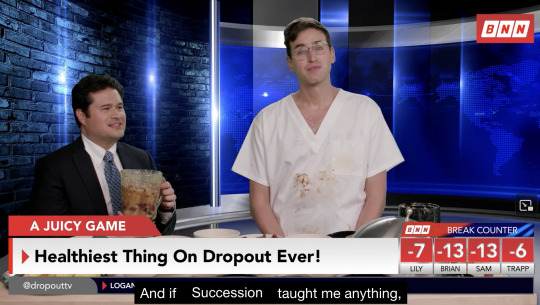
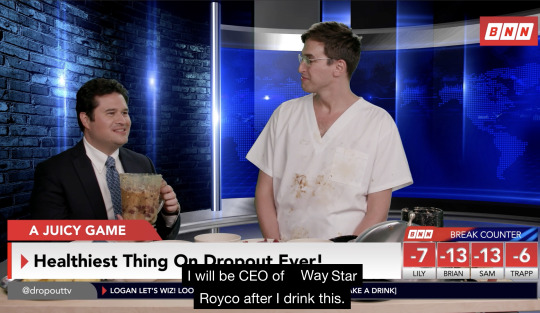
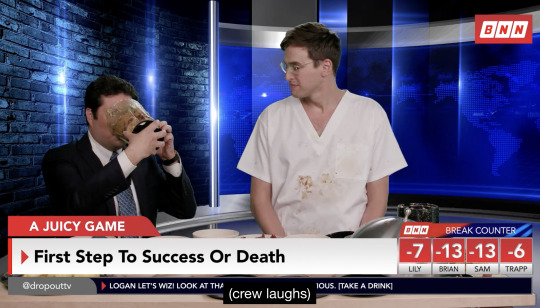
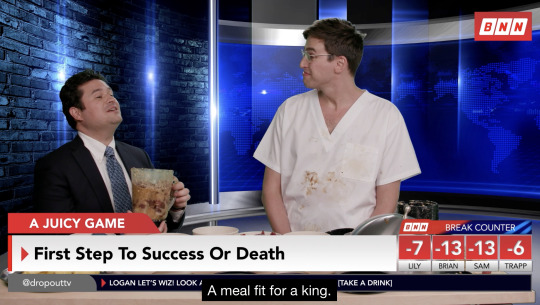
Trapp is the real CEO of WayStar Royco.
#I had to correct the subtitles that's why they look a little weird#dropout#dropout tv#breaking news#college humor#mike trapp#grant o'brien#succession#lily du#sam reich#brian david gilbert#michael trapp#breaking news network
21 notes
·
View notes
Text
Hello ladies
I want to try and sell some stickers at art markert in the near future. maybe one day making its way into the hands of users like you.... but idkkkk idonnttknowwwww >_< need to do urhhhh the social nertwork obviously and then perhaps succession not to mention better call Saul but lets not get ahead of ourshelves.. any ideas? kisses xxx
19 notes
·
View notes